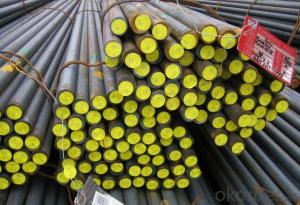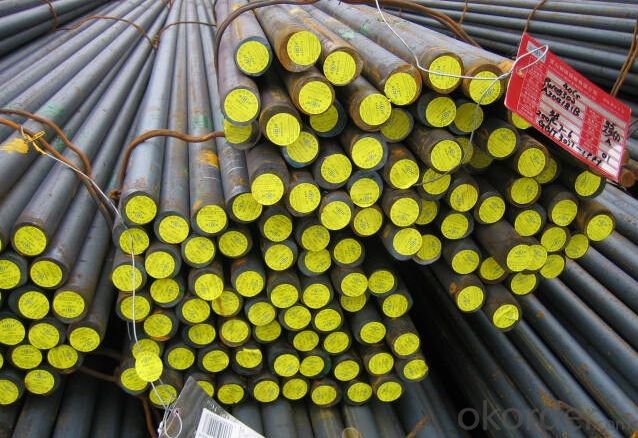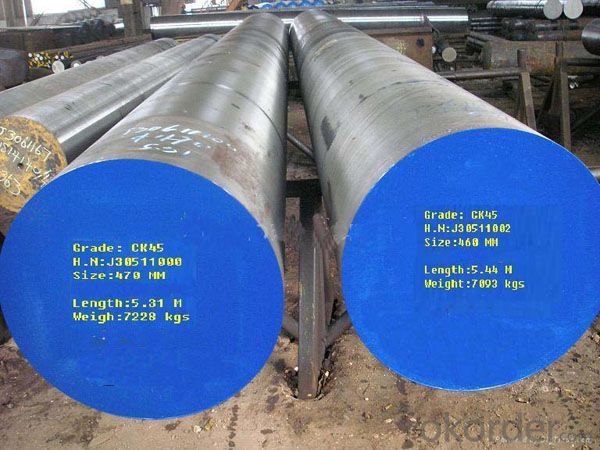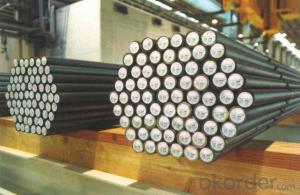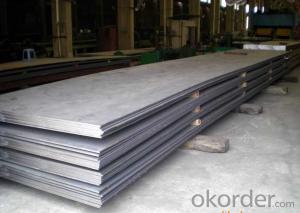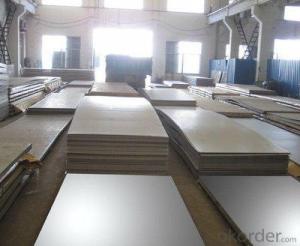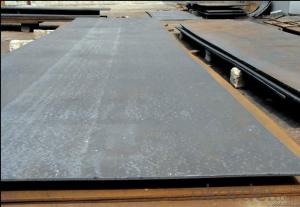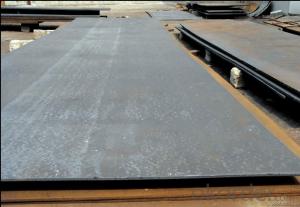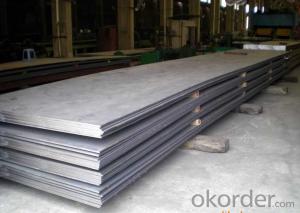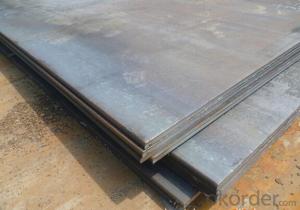K340/DC53 High Toughness Alloy Steel Plate
- Loading Port:
- China main port
- Payment Terms:
- TT OR LC
- Min Order Qty:
- 25 m.t.
- Supply Capability:
- 10000 m.t./month
OKorder Service Pledge
OKorder Financial Service
You Might Also Like
Specification
Chemical Composition(%)
| C | Si | Mn | Cr | Mo | V | S | P |
| 1.00 | 1.00 | 0.35 | 8.00 | 2.00 | 0.25 | ≤0.030 | ≤0.030 |
Available Size
Rolled flat steel :12-90mm × 205-610mm × L
Heat Treatment
| Item | Temperature ℃ | Hardness |
| Anneal | 820-840 | ≤241HB |
| Quenching | 1020-1040 | 62-65 |
| Tempering | No.1:180-200 | 60-62 |
| No.2:500-550(2) | 60-63 |
Characterstics
| 1.High toughness and abrasion resistance steel | |||||||
| 2.High hardening ability | |||||||
| 3.Less quenching deformation | |||||||
| 4.Higher toughness and more homogeneous carbide distribution than D2 steel |
Applications: Suitable for cold shearing dies,cutting dies,trimming dies,measuring gauges,wire-drawing dies,screw plates,cold punching dies,etc


1, Your advantages?
professional products inquiry, products knowledge train (for agents), smooth goods delivery, excellent customer solution proposale
2, Test & Certificate?
SGS test is available, customer inspection before shipping is welcome, third party inspection is no problem
3, Payment Terms?
30% TT as deposit and 70% before delivery.
Irrevocable L/C at sight.
4, Trading Terms?
EXW, FOB, CIF, FFR, CNF
6, After-sale Service?
We provides the services and support you need for every step of our cooperation. We're the business partner you can trust.
For any problem, please kindly contact us at any your convenient time.
We'll reply you in our first priority within 24 hours.
- Q: What are the different low-temperature grades of special steel?
- Special steel includes several low-temperature grades designed to withstand extreme cold conditions. Among the commonly used grades are the following: 1. Austenitic Stainless Steel: This grade, such as 304 and 316, is renowned for its excellent corrosion resistance and high strength in low temperatures. It finds frequent use in cryogenic applications like LNG storage tanks and cryogenic piping. 2. Ferritic Stainless Steel: Ferritic stainless steel grades, including 410 and 430, possess good ductility and resistance to stress corrosion cracking, making them suitable for low-temperature applications. They are often utilized in cryogenic environments that require both high strength and resistance to embrittlement. 3. Martensitic Stainless Steel: Martensitic stainless steel, such as 410 and 420, delivers high strength and good toughness even in low temperatures. It is commonly employed in applications demanding exceptional wear resistance and strength, such as valves and turbine blades in cryogenic systems. 4. Duplex Stainless Steel: Duplex stainless steel grades like 2205 and 2507 combine high strength, excellent corrosion resistance, and good toughness in low temperatures. They are extensively employed in offshore and subsea applications where low-temperature performance and resistance to pitting and crevice corrosion are crucial. 5. Nickel-Based Alloys: Nickel-based alloys, such as Inconel and Hastelloy, are renowned for their exceptional corrosion resistance and high strength in both low and high temperatures. They are widely used in cryogenic applications, including liquefied natural gas (LNG) processing plants, as well as the aerospace and chemical processing industries. Each of these low-temperature grades of special steel offers distinct properties and advantages, making them suitable for various applications in extreme cold conditions. The appropriate grade selection depends on factors such as the specific temperature range, required corrosion resistance, strength requirements, and environmental conditions.
- Q: What are the different types of coatings for special steel?
- There are several types of coatings that can be applied to special steel to enhance its performance and protect it from various environmental factors. Some of the common types of coatings for special steel include: 1. Zinc-based coatings: These coatings, such as galvanized steel, provide excellent corrosion resistance. The zinc layer acts as a sacrificial barrier, protecting the underlying steel from rusting. 2. Epoxy coatings: Epoxy coatings are highly resistant to chemicals, moisture, and abrasion. They are often used in industries where the steel is exposed to harsh conditions or corrosive substances. 3. Powder coatings: Powder coatings offer a durable and attractive finish to special steel. They are applied as a dry powder and then cured under heat, forming a hard, protective layer that is resistant to chipping, fading, and corrosion. 4. Ceramic coatings: Ceramic coatings are known for their high-temperature resistance and excellent thermal insulation properties. They are often used in applications where the steel is exposed to extreme heat or rapid temperature changes. 5. Organic coatings: Organic coatings, such as acrylics and polyurethanes, provide a protective barrier against moisture, UV radiation, and chemicals. They are commonly used in outdoor applications, such as architectural structures or automotive parts. 6. Phosphate coatings: Phosphate coatings are primarily used as a pre-treatment before applying other coatings or paints. They improve adhesion and corrosion resistance of subsequent layers, providing a more durable finish. 7. Polymer coatings: Polymer coatings offer excellent resistance to abrasion, impact, and chemicals. They are commonly used in industrial settings where steel is subject to heavy wear and tear. It is important to select the appropriate type of coating based on the specific requirements of the special steel and the environment it will be exposed to. Each coating type has its own set of advantages and limitations, so a thorough analysis should be conducted to determine the most suitable option.
- Q: What are the main applications of special steel in the mining exploration?
- Special steel is widely used in mining exploration due to its unique properties and strength. The main applications include the manufacturing of drill bits, drilling equipment, and machinery used in mining operations. Special steel's durability and resistance to wear and corrosion make it ideal for withstanding the harsh conditions encountered during mining exploration, ensuring efficient and reliable performance of equipment in this industry.
- Q: How does special steel perform in terms of corrosion resistance?
- Special steel performs exceptionally well in terms of corrosion resistance. It is specifically designed and engineered to have enhanced resistance against corrosion compared to standard steel. This is achieved through various alloying elements and specific heat treatment processes that create a protective barrier against corrosive elements such as moisture, chemicals, and atmospheric conditions. As a result, special steel exhibits excellent durability and longevity even in corrosive environments, making it a preferred choice in industries where corrosion resistance is crucial, such as marine, oil and gas, and chemical industries.
- Q: Can special steel be used in the medical device manufacturing industry?
- Yes, special steel can be used in the medical device manufacturing industry. Special steel alloys, such as stainless steel, are commonly used in the production of medical devices due to their excellent corrosion resistance, biocompatibility, and mechanical properties. These materials provide durability, sterilization compatibility, and are suitable for various medical applications, including implants, surgical instruments, and diagnostic equipment.
- Q: How does special steel contribute to improving product reliability in critical applications?
- Special steel plays a crucial role in enhancing product reliability in critical applications due to its unique properties. Its exceptional strength, durability, and resistance to corrosion, heat, and wear enable it to withstand extreme conditions and stresses. This reliability ensures that critical applications, such as aerospace, automotive, and medical equipment, operate efficiently and safely. Additionally, special steel's high precision manufacturing capabilities allow for the production of complex components, further enhancing the performance and reliability of the final product.
- Q: What are the properties of tungsten alloys?
- Tungsten alloys possess several notable properties, including exceptional hardness, high melting point, excellent corrosion resistance, and remarkable density. These alloys are also known for their exceptional strength, resistance to wear, and ability to retain their shape even under extreme temperatures. Furthermore, tungsten alloys exhibit good electrical and thermal conductivity, making them suitable for various applications in industries such as aerospace, automotive, and defense.
- Q: How is martensitic steel used in knife making?
- Martensitic steel is widely used in knife making due to its excellent hardness, strength, and ability to hold a sharp edge. This type of steel undergoes a specific heat treatment process called quenching, which transforms its microstructure, resulting in a hard and durable blade. The high carbon content in martensitic steel enables it to be heat-treated to achieve different levels of hardness, tailored to specific knife requirements. Additionally, martensitic steel offers good corrosion resistance, making it an ideal choice for various knife applications, from everyday kitchen knives to high-performance hunting or tactical knives.
- Q: What are the challenges in recycling special steel?
- One of the main challenges in recycling special steel is the complexity of its composition. Special steel often contains various alloying elements and additives that can make the recycling process more difficult. These elements need to be carefully identified and separated in order to maintain the desired properties of the recycled steel. Additionally, special steel may have undergone specific heat treatments or surface coatings, which further complicate the recycling process. Proper sorting, identification, and treatment techniques are necessary to overcome these challenges and ensure the successful recycling of special steel.
- Q: What are the properties of electrical resistance steel?
- Electrical resistance steel, also known as resistivity steel, possesses high electrical resistance due to its composition and structure. It has the ability to impede the flow of electric current, converting electrical energy into heat. This property makes it suitable for various applications, such as heating elements, resistors, and electrical wirewound resistors. Additionally, electrical resistance steel exhibits good thermal stability and corrosion resistance, making it a reliable choice for electrical and electronic devices.
Send your message to us
K340/DC53 High Toughness Alloy Steel Plate
- Loading Port:
- China main port
- Payment Terms:
- TT OR LC
- Min Order Qty:
- 25 m.t.
- Supply Capability:
- 10000 m.t./month
OKorder Service Pledge
OKorder Financial Service
Similar products
Hot products
Hot Searches
Related keywords
